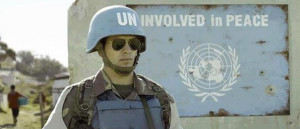Podcast Special! Why the Iran Deal is Constitutional, But Could Still End Up in U.S. Court
Due to my typical mid-summer lassitude (and a family vacation among the redwoods in California), I have not participated in the excellent legal blogosphere debate over the constitutionality of the Iran Nuclear Agreement which has included contributions from Jack Goldsmith, John Yoo, Michael Ramsey, John Bellinger, David Rivkin and many others. Luckily for me, Prof. Jeffrey Rosen and the good folks at the National Constitution Center allowed me to share my thoughts in a podcast discussion with David Rivkin, who with his co-author Lee Casey, has argued in the WSJ that the Iran Deal is unconstitutional unless submitted as a treaty under Article II of the U.S. Constitution. The 45-minute or so podcast can be found below, and I think it is worth listening in full.
But because I may not have made myself fully clear in the podcast, I try to summarize my thoughts here on why: 1) the Iran Deal does not have to be submitted as an Article II treaty; 2) the Iran Deal may allow individual U.S. states to impose sanctions on Iran which would likely lead to U.S. litigation. David Rivkin does a great job explaining his views on the podcast, which are worth listening to in full as well.
A) In my view, the Iran Deal (or JCPOA) does not have to be submitted as an Article II treaty for at least two reasons.
First, the terms of the agreement, which describe its obligations as “voluntary”, indicate that it is a nonbinding “political commitment”. Even the UN Security Council Resolution which supposedly enshrined the JCPOA into international law leaves some wiggle room for the U.S. allowing it to refuse to lift sanctions on Iran without violating the SC Resolution (or at least that is how John Bellinger reads it).
To be sure, there are indications that Iran itself doesn’t think the agreement is nonbinding and it does seem odd for the U.S. administration to make all this fuss over a 10 year agreement that is not binding, but (as Duncan has explained here and elsewhere), nonbinding political commitments are not unknown in diplomatic practice.
One example that I have been studying recently is the 1972 Shanghai Communique between the U.S. and China. This seems a classic nonbinding diplomatic agreement which nonetheless had enormous consequences for US-China and global politics. This and two later communiques remain crucial issues with respect to U.S. “promises” about the status of Taiwan and US promises to reduce arms sales to Taiwan. It is not exactly the same as the Iran Deal, which purports to require its parties to take certain specific actions on certain dates, but it has some of the same flavor.
For this reason, I don’t think a promise by the President to commit the U.S. to do something beyond his term of office changes this analysis much (contra Mike Ramsey). Presidents often promise on behalf of the U.S. to do things beyond his term, but as long as they are clear that these are political commitments, not legal ones, I don’t think a treaty is required.
Second, the JCPOA does not have to be submitted as a treaty because it doesn’t require the U.S. to change its domestic laws or even to change any domestic policy that is not already within the President’s constitutional or delegated statutory powers. Crucially, the President has delegated authority under the various sanctions statutes to waive or lift those sanctions without getting further congressional approval. That is by far the most important U.S. obligation under the JCPOA. The idea of giving the president these powers to lift sanctions implies that he will seek out certain changes in behavior by the sanctioned governments and then use those promised changes (by say Iran, or in the recent past Burma) as a basis to lift the sanctions.
There is a cost for the U.S. government in going the nonbinding route. It means that Iran should not feel itself “legally” bound to abide by the agreement, or at least those parts that are not enshrined in the UN Security Council Resolution. For U.S. constitutional purposes, it also means that any future president can withdraw from these political commitments without any requirement of legal consultation with Congress or any concerns about violating international law. A U.S. President is also empowered to withdraw from its UN Security Council commitments as well. (Actually, the JCPOA itself makes it pretty easy for the U.S. president to terminate the agreement according to its own terms). This seems only fair, however, and the administration clearly seems that this is a price worth paying to avoid the Article II treaty process.
B) State-level Sanctions on Iran Are Most Likely to End Up in Court
The individual states (e.g. New York or California) could impose certain sanctions on Iran after the deal goes into effect. Such sanctions will probably face litigation from the U.S federal government which will claim that any state-level sanctions are preempted by the JCPOA. But because the JCPOA is a nonbinding agreement, the preemptive effect of the JCPOA is weaker than of a full-scale treaty or executive agreement. The outcome of such a case against state-level sanctions is far from clear and may require the federal court to consider the nature of the JCPOA more carefully. My guess is that they would find it constitutional, but might be inclined to uphold the state-level sanctions. That last finding is a close call and I would love to see that case, which could very well happen in the near future.
In short, although I don’t think the Iran Deal is a very good deal for the U.S. and I hope Congress blocks it, I don’t think the JCPOA is unconstitutional. We will hopefully get some litigation on this point in the near future when some state rolls out its anti-Iran sanctions. But opponents of the deal should focus on the politics (getting to 67 votes in the Senate and/or a Republican President) rather than the law.


 Print This Page
Print This Page


